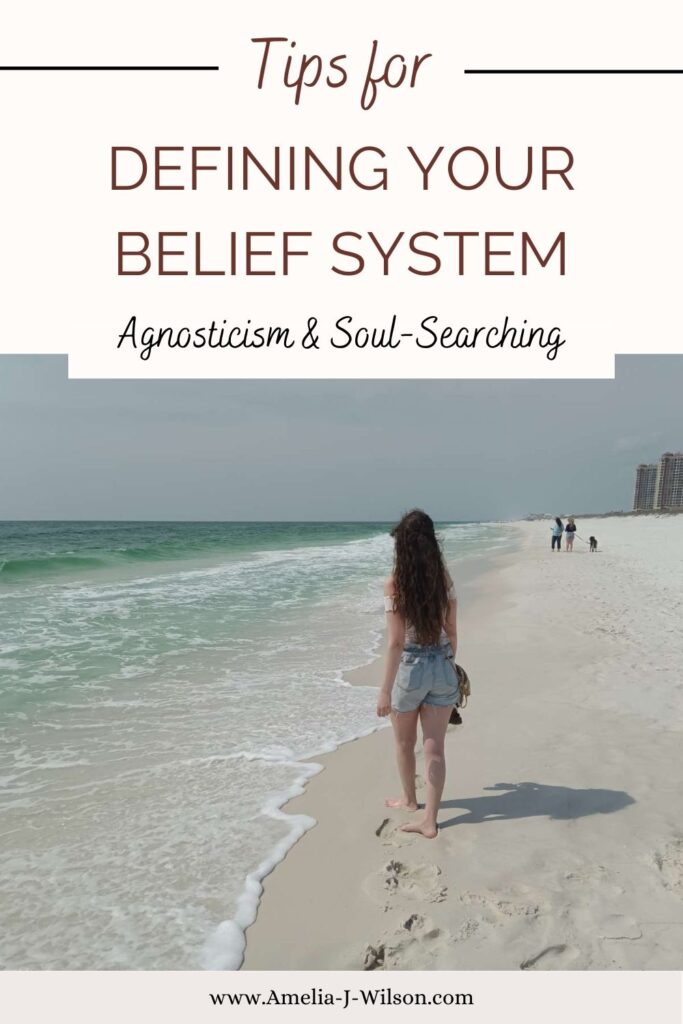Agnosticism. What does it mean to be agnostic? Is being agnostic okay? Why do some people leave religion and search for another? How do you know which faith is best for you? These are questions that I often ask myself. And while I now have a greater understanding of my own personal beliefs and philosophies, I am by no means finished with my soul-searching journey.
And today, whether you are agnostic, soul-searching, or just curious about it all, I’ve decided to dedicate a post on what agnosticism is and how to find your belief system in a world filled with many diverse ideas and faiths.

Disclaimer: All of the views and opinions in this post are solely my own and are not sponsored. This post may include affiliate links, meaning I earn a commission through links at no cost to you.
Recently, I posed a question to my community tab over on YouTube about what topic you guys were interested in hearing next. And from the majority vote, this topic is the one that was chosen.
Before we dive into it all, I wanted to point out that I am by no means a spiritual expert, consultant, or religious leader. I am a writer and tarot reader by profession, and I am soul-searching, just like many of you who will likely stumble across this article!
Though with that said, I do want to offer some tips on exploring your faith and how to nail down a solid belief system. While this is based on my own experiences, I’m optimistic that these tips will—if nothing else—point you in the right direction!
What does agnostic mean?
Before we go into the tips, we need to define what agnostic means. Many people might have heard the term but aren’t sure exactly what it represents.
According to Google: Agnostic means,
“a person who believes that nothing is known or can be known of the existence or nature of God or of anything beyond material phenomena; a person who claims neither faith nor disbelief in God.”
Google Dictionary
I think that last part is interesting because it seems to me to be the more casual definition of agnosticism. When we think of agnosticism, we think of someone who is uncertain or who doesn’t know whether or not god exists. We think of somebody sitting on the fence between religions, neither agreeing nor disagreeing whether or not god(s) or the afterlife even exists.
But the first part of the definition caught my attention. “A person who believes that nothing is known or can be known of the existence or nature of God or of anything beyond material phenomena.” I think this can be its own philosophy in a way. If we can’t be truly sure whether god or the afterlife exists beyond this plane of reality, then we cannot prove or disprove it, meaning we accept that either probability could meet us in death.
I think this makes agnosticism a religion or spiritual belief in its own right. And through this, I think it’s possible that you could remain agnostic and that it could be a solid belief system on its own.
But what about those of us who are agnostic because we are unsure? Because we don’t have the answers, but we’re seeking them? Through the lens of that more casual definition, I wanted to offer some tips to those who are working to find a belief system that feels right.
Tips for finding your belief system
Below are some of my best tips for finding a belief system that feels right to you. Soul-searching and spiritual discovery can take YEARS to work through, and every individual path is unique. While many of these tips have helped me formulate a few of my foundational beliefs, I (like you, I assume) am still soul-searching. It’s a process! It takes time! And that’s okay!
Keep an open mind
My first tip is fairly simple and will likely have you rolling your eyes, but it’s very important! Keep an open mind!
I think it’s easy to write off belief systems we don’t fully understand or those we’ve had negative experiences with in the past, but I think that’s something we should try to avoid. Instead, consider each faith on its own and really look into it. Don’t overlook something because of pre-existing biases.
Now, I will point out that some faiths might bring you fear or discomfort. And I’ve found that in times when something just doesn’t feel right, then maybe it’s not right for you. For example, I practice Tarot, and I LOVE the tarot. It’s a big part of my spiritual practice. But some people I’ve met have been afraid of it. The tarot, to them, is demonic, or at least, it makes them feel uncomfortable. And to that, I would say that perhaps the tarot isn’t for them. Sure, there are times when we can all benefit from breaking out of our comfort zones and trying something new and/or scary. But there are also times when we need to trust our intuition and better judgment.
If it feels right, it’s probably right.
If it feels wrong, it’s probably wrong.
Trust yourself in this process.
Additionally, when I say to “keep an open mind,” I also mean you should consider religions and practices you’ve never heard of before. The world is filled with over 4,000 religions and likely millions of practices. I encourage everyone who is searching to keep an open mind and look into practices and faiths they’ve never heard of.
For example, you may have heard about Christianity and Hinduism. But have you heard of Omnism, Unitarian Universalism, Shaivism, or Jainism?
Remember that some religions and practices are considered “closed.” A closed religion or practice means you cannot participate in that religion/join it unless properly initiated by those already participating in it. Some religions, like Zoroastrianism, do not offer initiations and are closed to outsiders. Be sure to do your own research about any religion you’re interested in before embarking on a journey of exploration. It’s important to be respectful of each religion’s rules and expectations before integrating something within your own practice.
Try anything once
Aside from doing your own research and keeping an open mind about the religions available to you that you can explore, I also encourage you to try anything once.
Again, trust your intuition with this one.
Try using pendulums or attending a Holi festival, or giving appropriate offerings to a deity. You never know what will click, so I find it to be useful to try anything once (for the most part). Keep in mind that you will need to do a lot of research beforehand, and it can help to find someone within a religion you’re interested in to help guide you or give you more information.
Tips:
- Speak to someone from a religion or practice you’re interested in.
- Go with them to ceremonies and events if you can.
- Attend festivals and religious events which are open to the public.
- Visit public religious sites and spaces.
Some of the things I’ve been fortunate enough to participate in are a Holi festival, Durga Puja, a Hindu wedding, visiting many different Christian and Catholic churches, attending a church event on Christmas Eve, attending a quinceañera, speaking to people of many different faiths, speaking with and hearing stories from a Shawnee elder, etc.
Explore if you can! Speak to many different people! And through this, you may solidify some of your personal beliefs.

Meet people in different communities and have a discussion
This sort of goes back to what I said above, but speaking to people and having honest and open discussions about faith is so incredibly beautiful and life changing. I’ve been very blessed to live in a diverse community and to have spoken to people with so many rich and interesting backgrounds. I think this has been one of the tips on this list that have helped me the most.
Being able to ask genuine questions to people from different faiths has helped me come to realizations about my own beliefs. Of course, you should always be respectful and walk in with the intent to learn. Doing so will help you find many answers and experiences that you can’t get from a textbook.
Research, research, research
This tip is also fairly straightforward. As you embark on a journey of spiritual self-discovery, the best thing you can do is research. Research anything and everything you can get your hands on. This tip is especially valuable if you are completely unsure of what you believe. Look for letters and testimonials about people’s experiences with the divine. Read religious texts and learn as much as you can from spiritual leaders.
You have the internet in the palm of your hand. It’s one of the best resources for finding anything and everything about almost any faith you’re interested in.
I’ve also found that religious source texts like the Bible, Quran, Torah, I Ching, Vedic texts, etc. are much better than any online blog, forum, or testimonial. Sure, I love and value spiritual books by religious leaders and I enjoy online sermons, but the source texts are hard to beat. If you want to know what a religion’s core values and beliefs are, you can’t go wrong with a solid source text. It’s in these books that I’ve really been able to get solid on my belief systems.
Unpack any religious trauma or negative past experiences
Before I truly dove into my own spiritual journey, I avoided Christianity like the plague. I thought that Christianity was awful, and I didn’t believe in its values or its God. But after some time, I finally decided to read the Bible. And guess what? It’s one of my favorite spiritual reference books. Am I Christian? No. But I do enjoy the Bible.
I realized that I needed to unpack my own past religious experiences with the church in order to create a new foundation for deity and source. I avoided the Bible and the Christian faith because of my negative experiences. So I present to you a question to ask yourself:
Was that a negative spiritual experience or a negative interpersonal relationship that prevented you from exploring a certain faith or topic?
In order to pursue more knowledge and more self-exploration, we must first break down and unpack negative experiences caused by other people. All faiths can be kind and beautiful. But sometimes people, average people like you and me, can give us a bad experience. So if you have any religious trauma or negative experiences, I recommend you attempt to heal those parts of you and come back to the religion or its source text with a fresh lens.
Consider the foundations of things you currently believe
Another thing you can do before embarking on religious or spiritual exploration is to consider what you already believe.
Ask yourself the big questions:
Do you believe in god/gods?
Do you believe in an afterlife?
What does that afterlife look like?
Do you believe in astrology?
Do you believe tarot works?
Do you believe in psychic abilities?
Etc.
Some of these questions you may not have an answer to. And others, you may lean a certain way or have a certain belief already in place. Personally, I have my own answers for all but two of these. And that’s why I’m still searching.
Look into different religions and their attributes/rules. Consider whether you agree with one or more of them. Keep narrowing down your belief system
One way I decided Christianity wasn’t for me was because I didn’t agree with all of its rules or attributes. I do find value in the Bible. And I do think there’s a lot of beautiful meaning in the biblical stories. However, I don’t believe in all of the Bible’s rules—like those regarding divination, for example. And from this, I know that Christianity is not the belief system for me.
As you learn more about different faiths, you can ask yourself if you agree with all they entail. If you do, then perhaps that faith is something you can lean into. And if you don’t, perhaps you need to keep searching.
Or, as with my case, I’m formulating my own independent belief system separate from religion. And that’s okay too!
Keep exploring
As with most things that are personal to us, it’s important to be a forever-student. Keep learning. Keep exploring. Keep experiencing new things and work to form some foundation in your own belief system. It could take years, but there’s something so valuable and special about speaking to people from all walks of life, looking into the source texts, and attending religious events that help you find connection with the divine. It is an incredible and personal journey, and it’s okay if you don’t have all the answers right away.
Don’t rush things.
Take your time. What is meant to come will come, and I don’t think you should force a belief system that isn’t working. Keep exploring, and with time, you’ll continue to narrow down your own faith.

If you like this post, check out some similar posts of mine below!
- Everything you perceive is thought: what to know about the role of consciousness on reality
- Universal oneness: what does it mean and why is it important?
- Agnosticism and soul-searching: Tips to help you define your spiritual belief system
- 23 Things to Help You Navigate a Quarter Life Crisis
- How to live with intention & why it’s so important to have an intentional mindset
Feel free to leave a comment below.
You can also email me with questions or concerns you may have at info.amelia.wilson@gmail.com
Also, be sure to check out my books if you enjoy fantasy stories (:
Disclaimer: All of the views and opinions in this post are solely my own and are not sponsored. This post may include affiliate links, meaning I earn a commission through links at no cost to you.
Thanks again

